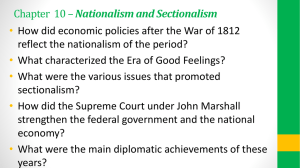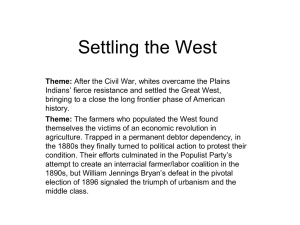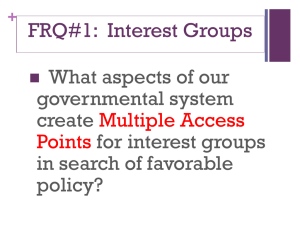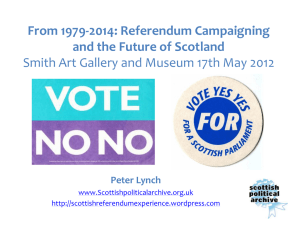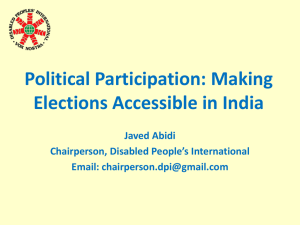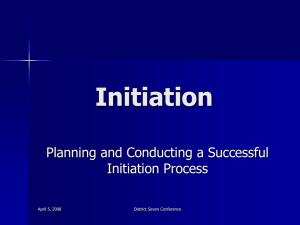British Election Study 2015: Voters in Context
advertisement
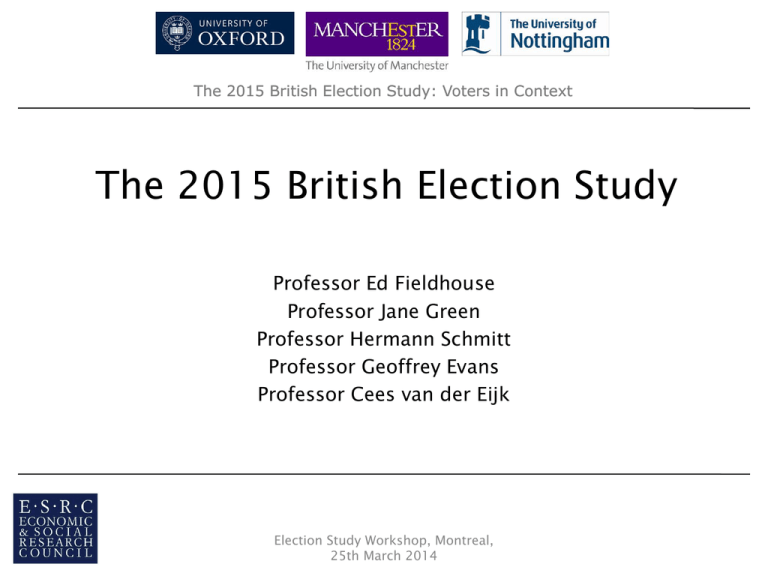
The 2015 British Election Study: Voters in Context The 2015 British Election Study Professor Ed Fieldhouse Professor Jane Green Professor Hermann Schmitt Professor Geoffrey Evans Professor Cees van der Eijk Election Study Workshop, Montreal, 25th March 2014 The 2015 British Election Study: Voters in Context Three successful research funding applications The 2015 British Election Study: Voters in Context Data collection to enable understanding of the 2015 British election, continuing the series of British Election Studies since 1960. The Scottish Independence Referendum and the British Voter: an enhancement to the British Election Study Internet Panel Funded under the Future of UK and Scotland initiative Significant enhancement to the BES online panel study; additional waves in January and September 2014; enlarged samples in all waves up to Summer 2016 (Scottish, Welsh and English), sample of 16-17 year olds. 55,000 additional target interviews in total. Enhancing the Impact of the British Election Study Resources for a part-time Impact Fellow/researcher and senior media advisor providing support for dissemination and engagement. Election Study Workshop, Montreal, 25th March 2014 The 2015 British Election Study: Voters in Context BES 2015: Themes, Study Design, Priorities Disengagement, Accountability and Representation Informs the prioritisation of items e.g. trust, turnout, registration, policy responsibility and delivery; issue-scales for longer term comparability Research partnerships and engagement, e.g. Electoral Commission, Hansard Society Sampling design and stratification; minimal clustering, response rates for hardto-reach groups; constituency and campaign characteristics, and socioeconomic context, etc. Linking of data, to candidate and campaign characteristics, etc. Need to understand the Scottish Referendum, and other elections. Understanding the vote choice and the voter in context Spatial context; socio-economic, political and inter-personal context Political and institutional context; sub-national and cross-national elections Temporal context; the need for panel data and long-term comparability The context of survey measurement; within-survey effects and mode effects Election Study Workshop, Montreal, 25th March 2014 The BES instruments January 2014 May 2014 September 2014 Base sample N = 20,000 European and local elections N = 20,000 Independence referendum N = 20,000 2010 election sample Voter registration data matching 2005 election sample 2015 General Election Pre Post N = 20,000 N = 20,000 Daily rolling thunder N = 650 per day Twitter data harvest May 2017 May 2016 Local elections N = 15,000 Scottish and local elections N = 20,000 Election Study Workshop, Montreal, 25th March 2014 Post-election face-to-face probability sample + mailback inc. CSES module N = 3,000 The 2015 British Election Study: Voters in Context • Post-linking of data for users • • • • • • Turnout validation (F2F) Registration checking (BESIP) Constituency data Local Census data expert survey for party placements Integrating BES data within a network of complementary studies • Pre-linking of data with studies receiving and/or likely to receive funding British Candidate Study (Campbell, Hudson, Rüdig) Proposed study of candidate websites (Milazzo) Party Strategies Study (Cowley, Goodwin) Online campaign (iBES) (Gibson) Constituency Agents Survey (Fisher, Fieldhouse, Cutts) Campaign media content (Stevens, Banducci, Gibson) Macro-database on socioeconomic context Twitter Study Campaign spending data (Johnston, Pattie, Cutts) Harnessing & broadening the value of: BES voter surveys Constituency database (Norris / Thrasher) Policy outcome database on lower-level output areas Scottish Referendum Study (BES/UK Initiative) Welsh Election Study (Scully, Jones) Scottish Election Study (SES) (Carman, SES Team) Qualitative Election Study of Britain (QESB) (Winters) Data gathering with: Comparative Study of Electoral Systems / World Values Survey / ESRC’s Understanding Society Liaison/best practice: US National Election Studies, Annenberg Campaign Studies, European Election Studies, etc.. (Winters) Insights from: Manifesto Research on Political Representation (MARPOR/CMP) (Budge, Regel) The 2015 British Election Study: Voters in Context International and comparative • Prioritising established questions • European Election Study module (BESIP wave 2) • Comparative Study of Electoral Systems: post election mail back or stand alone survey. • International advisory board – and liaison with other national election studies Election Study Workshop, Montreal, 25th March 2014 The 2015 British Election Study: Voters in Context BESIP innovative features • • • • • • • • • User experiments and proposals (‘playground’ items e.g. certainty scales) Split sample for alternative questions (e.g. PTV and party feeling scales; European integration position) Randomisation of question placement (e.g. party ID, vote choice, MII, trust) Randomisation of question object within grid (e.g. party leaders & issues for evaluation of performance & responsibility) and of response categories (e.g. social desirability) Psychological characteristics: social desirability, risk taking Individualised (pre-loaded) questions: who is your local MP? Discussant network module: focus on turnout and household relationships (norms, expressive motives, costs). Political knowledge quiz with pictures Mapping local community Election Study Workshop, Montreal, 25th March 2014 The 2015 British Election Study: Voters in Context Innovation: mapping project • Collaboration with Cara Wong, Jake Bowers and Daniel Rubenson • Respondent define their own communities (using Google mapping technology) • Respondent perceptions of neighbourhood: e.g. economic performance, norms of turnout, effect of cuts, legacy of Thatcherism, impact of immigration, social, political and ethnic diversity. • Equivalent questions about pre-defined geographies (e.g. constituency) • Potential for linking objective data • To be introduced in BESIP wave 3. Election Study Workshop, Montreal, 25th March 2014 The 2015 British Election Study: Voters in Context The 2015 British Election Study: Voters in Context The 2015 British Election Study: Voters in Context Four Examples of “Local Communities” The 2015 British Election Study: Voters in Context Innovation: social media • Gather tweets (from firehose) during the 2015 campaign by a predefined/responsive list of relevant hashtags and topics • Indicator of issue salience and emphasis in campaign • Potential for sentiment analysis of positive/negative tone • Gecoding of tweets for linking with constituency and candidate data • Gather all tweets and follower information on BES respondents who provide twitter handle. • Allows comparison of respondents and candidates Election Study Workshop, Montreal, 25th March 2014 The 2015 British Election Study: Voters in Context Website • New professionally designed BES website • One stop shop for new BES data historical data • Data playground feature: create simple charts & tables • News, blogs, working papers etc. • To be launched in April Election Study Workshop, Montreal, 25th March 2014



